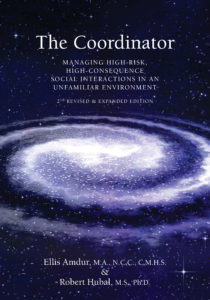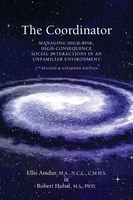This book synthesizes Amdur and Hubal’s work into several broad themes:
- Ways of communicating that both research and experience have shown are most reliable in establishing respect and rapport, while maintaining tactical strength with others, even those from very different cultures or environments.
- Core elements and concepts that are a necessity in any potentially adversarial environment.
- Maintaining an effective stance and self-control throughout the interaction, no matter how difficult it is.
- Key techniques for ensuring that the dialog goes smoothly, and ways to recover when it goes sideways.
- The Coordinator maintains a focus on tactics, doing everything possible to enhance the safety of all people involved in the encounter. Simultaneously, the Coordinator strives to achieve a level of trust, engaging others with professionalism and respect. The Coordinator crafts the communication to form a working relationship to share in achieving the aims of the mission.
- This book is dedicated, in particular, to those at all stages and levels in law enforcement and the military who are, as current trends continue, going to be placed into more and more situations where their Coordinator skills will be absolutely critical to the other person’s survival—and their own.
- This revised, expanded edition adds a number of practice examples to illustrate each skill and hones down the descriptions of these skills so that they are more easily accessible when in emergent situations.
Statement from Ellis Amdur
This book embodies the core principles that imbue all my work in crisis intervention. I have been fortunate to engage in a true collaboration with Robert Hubal, a cognitive scientist, who works on the leading edge of the study of communication in high-risk, high-consequence situations. We met through our participation in a project funded by DARPA (Defense Advanced Research Projects Agency), entitled “The Good Stranger Project.” I was brought in as a kind of ‘outlier subject-matter expert’ (something for which DARPA is renowned, enabling them to include ‘outside the box’ ideas in their endeavors). What I offered was a combination of several decades front-line work in crisis intervention informed by core principles derived from classical Japanese combative arts. Within these archaic traditions lie profound teachings on applied psychology within dangerous situations—how do you influence someone who is either actively trying to kill you, bears that intention, or at minimum, regards you with hate, fear or mistrust?
Together, Robert and I have created a unique work. The book is geared for trainers in very specific roles, but the content goes far beyond that. It is written in plain language and accessible imagery, and will be valuable to anyone: from warfighters in another people’s land or police officers in a tough neighborhood to those working in emergency medicine, social services, businesses or schools.
From Dr. Don Gemeinhardt (Col. USAF Retired)
I have known Robert Hubal for many years, starting as a colleague at RTI International, and continuing to other training and educational efforts involving military and law enforcement. The Coordinator, a result of his collaboration with Ellis Amdur, offers a clear approach to confrontations with adversarial, potentially dangerous individuals. This ‘Coordinator Mindset’ focuses everyone involved on both the problems and resolution of an incident. From my over 40 years of service in the military and then in law enforcement, as well as my studies on interviewing and effective methods for training interviewing skills, I see these skills as valuable in military personnel at various levels as well as in the law enforcement and intelligence areas. This is a great book to have around to aid in achieving the best solution possible, while lowering the risk of the encounter turning violent, without compromising the military or law enforcement mission that brought one into the situation.



